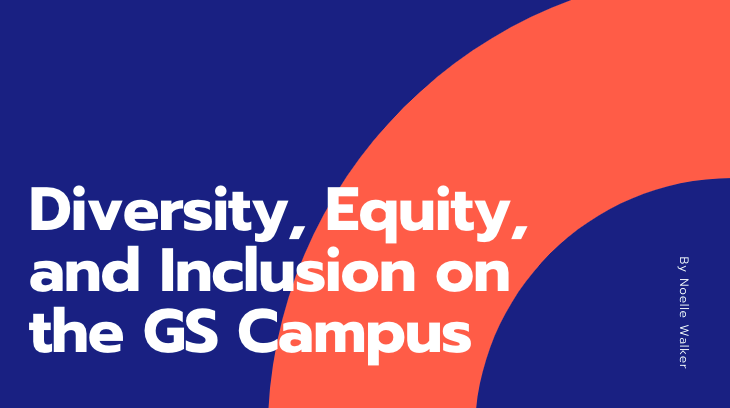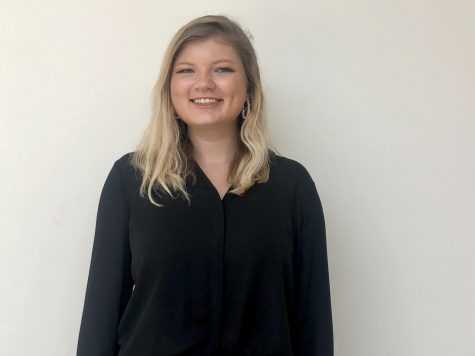Diversity, Equity, and Inclusion on the GS Campus
February 11, 2021
EDITORS NOTE:
This installment is the second in a series of articles listening to the GS community discuss diversity, equity and inclusion at GS as the university begins implementing its inclusive excellence action plan.
Takeshia Brown, the Director of the Office of Multicultural Affairs (OMA) provided some insight into her efforts to make the university more inclusive while also sharing her advice for ways the school can improve its response to incidents.
Brown said that GS is a diverse campus, featuring people from all over the place with different genders, racial identities, languages and more. She described inclusion, at least for her, is the level in which people feel valued, accepted and appreciated in the space. She posed the question “can I show up as my full self and be recognized in this space? And then equity–do our students and faculty and staff do they have what they need at the basic level to be able to show up and be who they are?”
Brown said those are some spaces where we have opportunity to grow and do some work. For the OMA specifically, they carry out mentor initiatives on both campuses and host cultural events. OMA also has seven programs that work with traditionally underrepresented cultural groups that provide opportunities for students to create community and to have a sense of belonging as well as figure out various strategies to navigate campuses with those unique identities.
“[OMA is] creating opportunities to celebrate those identities throughout the year. It’s something we’re focusing on…so to celebrate those communities and make folks aware that these identities exist, [and] not only do they exist, they need to be supported and celebrated and acknowledge on our campus,” said Brown.
Brown added that we’re all Georgia Southern Eagles and that the things we experienced are unique to our identities that “we have to give space and give support to, and our office through those programs [is] trying to do that.”
A lot of Brown’s work she does for OMA is administrative. She looks at budgets, combs reports and gets things prepared to be able to appropriately allocate these resources to my team so that they can work and also advocate on behalf of the needs of her staff and students. A lot of what she does is attend meetings as well.
“I can be in a meeting that has absolutely nothing to do with inclusive excellence or diversity inclusion on the onset, but there could come issues come up that will require me to advocate on behalf because that came up,” said Brown. “And so it’s important for me to to speak up and to be present in those meetings, and so there are a lot of administrative duties and things of that nature folks don’t think about us doing, and as a small staff, we just try to support all all other people and all the other initiatives that are happening on our campuses.”
Brown acknowledged how there have been a lot of incidents on campus that have made national headlines, but she said she thinks those moments have made GS “think about different ways to have these conversations and implement these strategies and ideas across the institution.”
Brown said that GS having a chief diversity officer and having that person have the agency to make decisions about what our campus looks like as an inclusive university has been huge. She added that there has been lot of conversation on policy review and whether or not policies are written and being implemented from places that are inclusive in nature–a lot fo which comes up in meetings.
She said that this has a renewed sense of purpose for a lot of people. Brown added that she thinks the frustrating part, especially for students, is that you hear the things the university is doing, but sometimes you don’t see the things manifest.
“We need to do a better job of telling and showing what’s happening so that people can see that we’re doing the work,” said Brown. “Oftentimes, some of it may even feel reactionary. A lot of times these things have been happening, but we just didn’t know about them until a flashpoint or something occurred. And so all that to say I think we’re making strides in the right direction, I think it maybe took us a little while to talk actually find out footing as a university and figure out what that looks like, but I’m confident that we’re heading in the right direction in terms of providing inclusive opportunities for every person connected to our campus.”
Brown said that one of the things that’s always been readily a concern to her is that sometimes GS doesn’t respond quickly enough when things happen.
“Granted, there’s a lot of reasons why we can as a university system for the school, there protocol procedures that we have to follow,” said Brown. “But sometimes response needs to be immediate. We can’t always wait a long time like people want to know from the university, both faculty, staff, students and community members, what’s going on there?…I think in the past, that’s been one of our shortcomings.”
Brown also mentioned how the university has been doing a lot of talking about how nothing will happen to a student because of freedom of speech.
“There is freedom of speech, and we understand that. But what does that mean? How is that applicable in this case? And what does that mean for other students who are affected or bothered or concerned about this issue? …If the answer’s no, we don’t take time to explain the why behind what’s going on and creating those opportunities to have those conversations,” said Brown.
Brown acknowledged that sometimes she’s too focused on the next step to sit down and appropriately dissect and have the much-needed conversations with students which is something she’s been working on.
“One of the things that I’m focused on this year is how can we get back to them, right? How can we be more proactive in the conversations? Unfortunately, we anticipate these type of things happening on a college campus…but how can we prepare our students with appropriate information, tools and resources so they know how to protect themselves [so] they know how to respond to these situations [and] they know how to use the resources,” said Brown.
Brown said she thinks one of the things the university does not do well is explaining what resources they have and how to use them to students. She also feels that, if they included information on freedom of speech and hate speech before incidents then it would have better prepared students as well as better prepared them to have conversations where students process how they’re feeling because feelings are valid.
Brown is having those conversations with her team, and she’s being reflective on her role and sphere of influence as well. She’s questioning how we can do a better job of communicating that, student leader training, and creating opportunities to have that space for that.
“If that’s, you know, after an event, I may not have the agency as the Director of the Office of Multicultural Affairs to send out correspondence, but I have leaders that I can connect with and create spaces and create opportunities to converse a dialogue for them rather than waiting on a response from somewhere else, [and] use my area and sphere of control and talk to those people and check in on them,” said Brown.
Brown said it’s easy, particularly in an organization as large like OMA to be like, ‘Oh, well, they told me, I can’t do that.’ or ‘oh, well, that’s somebody else’s responsibility.’
“But when we’re talking about leadership, leadership is more than a position, and granted, I have a position as a director, but as a person, I still have …some people that I have influence over or just people that I’m in connection and relationship with,” said Brown. “And so if I care about them like I think I do, then it would behoove me to kind of uphold those things and be introspective about how I can better support them.”
Brown said with these issues–particularly with the freedom of speech responses from the university–that they’re sticky. She said unfortunately sometimes the copy-and-paste answers are what the university has to give. Brown added that it’s not the best answer and sometimes it may not be the most eye shaped message.
“I think as students, it’s important to know that you have, you still have voice,” said Brown. “You still have places and people who want to talk to you and hear about those things. Don’t just stop at the message, right? So the message may say…this incident is protected by freedom of speech. Well, what does that mean for you as a student? And how can you use your voice within the confines of freedom of speech and other campus policies to make your voices heard about that issue?”
Brown cited some ways that students can make their voices heard by writing an opinion piece for The George-Anne as well as reaching out to OMA and other student organizations. Brown said she hears and understands students’ concerns and frustrations, but, at the end of the day, everyone is a part of the GS community.
“I think we always are supposed to move beyond the frustrations and be very strategic about what can we do next,” said Brown. “Are we going to stay here and pick this situation apart because we already have an official response from the university? Or are we going to try to find solutions to move forward as a community to empower ourselves and create spaces where maybe this doesn’t happen?”
Brown said students really have this power.
“What if the student culture was so strong to where, when these incidences happen in very safe ways that doesn’t violate the First Amendment or any other student code of conduct, you say that this isn’t allowed in our space. Hate isn’t a part of what it means to be a Georgia Southern student, and, because it’s not a part of that, we’re going to flood Twitter and Instagram and all those things, with loving and empowering messages instead of tearing this person apart or harassing this person?”
Brown acknowledged that anger is a very real response and the anger is not invalid, but she thinks when you can move beyond some of the emotional pieces, you’re able to think more strategically about what we want our community to look like.
Brown said there are lots of possibilities for where we can grow as a university with respect to diversity and inclusive excellence. She said she knows that for a lot of people there seems to have been a flashpoint every single semester “and it can be hard to get up and show up every day and move through those things, but I truly believe that we have people who are committed to this work and committed to making our campus a very inclusive place for all people and that our students are going to be the best message and the best carriers of that message.”
“I think, when we can start to change the narrative to create more positive conversations, it doesn’t necessarily mean the hate goes away, but at least for a while, the atmosphere is a little different, and so I also don’t want to be like overly toxic positive about all of these things because these are very real issues, and we need to address them. But I also think we have to acknowledge our power as students, particularly for you all, to kind of shift some of the narrative a little bit and really help people see what Eagle Nation is all about,” said Brown.




